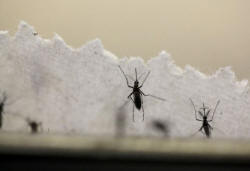|
 CDC
issues travel advisory for Brownsville, Texas, over Zika CDC
issues travel advisory for Brownsville, Texas, over Zika
 Send a link to a friend
Send a link to a friend
[December 15, 2016]
By Julie Steenhuysen
CHICAGO (Reuters) - The U.S. Centers for
Disease Control and Prevention issued a travel advisory on Wednesday
warning pregnant women to consider postponing travel to Brownsville,
Texas, because of the risk of contracting Zika.
|
|
 The advisory, issued through CDC's Health Alert Network, follows
reports of infections in five people living in the Brownsville area
who have contracted Zika through local mosquitoes, suggesting an
ongoing risk of Zika infection. The advisory, issued through CDC's Health Alert Network, follows
reports of infections in five people living in the Brownsville area
who have contracted Zika through local mosquitoes, suggesting an
ongoing risk of Zika infection.
“We are working closely with Texas to gather and analyze new
information every day," CDC Director Dr. Tom Frieden said in a
statement.
Frieden said Zika appeared to have been spreading in the Brownsville
area "for at least several weeks," which prompted the agency to
issue the warning and urge pregnant women who live and work in the
area to take steps to prevent mosquito bites.
Texas is one of several U.S. states where Aedes aegypti mosquitoes,
which carry Zika, are present. It is the second state within the
continental United States after Florida to report local transmission
of the virus that has been linked to birth defects.

The CDC said there was currently no evidence of widespread
transmission of Zika, but temperatures are still warm enough in the
Brownsville area - located near the Mexico border - to support
mosquito-borne transmission of the virus, which has been shown to
cause birth defects.
The advisory says that pregnant women in the area are at some risk
of Zika, but the extent of risk is unknown.
It urges pregnant women, women of reproductive age and their
partners who live in or have traveled to Brownsville on or after
Oct. 29, 2016, to get tested for Zika.
Women who have been exposed to Zika through visiting the area, or
unprotected sex with someone who has visited, should wait eight
weeks before attempting to conceive.
[to top of second column] |

Men who have been exposed in the same way should consider waiting at
least six months before attempting to conceive a child to prevent
sexual transmission of the virus.
Earlier on Wednesday, the CDC released a study showing that 6
percent of fetuses or infants whose mothers were infected with Zika
during pregnancy developed birth defects, including microcephaly, in
which the baby has an undersized head and brain.
The connection between Zika and microcephaly first came to light
last year in Brazil, which has since confirmed more than 2,200 cases
of the birth defect.
(Reporting by Julie Steenhuysen; Editing by Bernard Orr and Tom
Brown)
[© 2016 Thomson Reuters. All rights
reserved.] Copyright 2016 Reuters. All rights reserved. This material may not be published,
broadcast, rewritten or redistributed.
 |